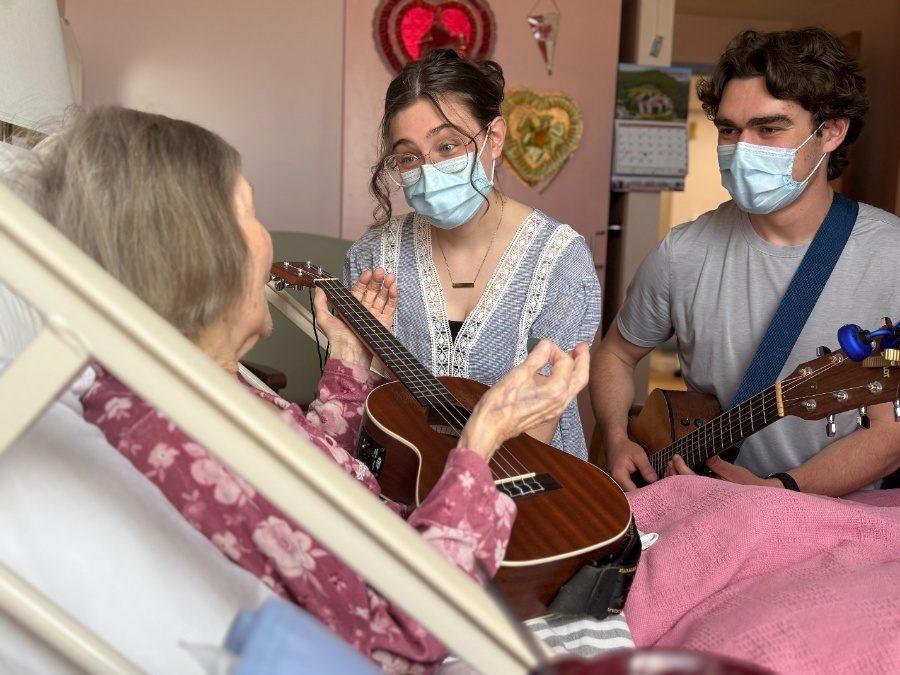In a back room at Reconnect Community Health Services in Toronto’s west end, five performers, bearing a guitar, a ukulele, and a small sound system, enter a common room, where seniors from the centre’s adult-day program are gathered in a loose semicircle. Some greet the musicians with eager familiarity, while others wait in silence. Over the next hour, the players will invite each listener into a shared moment of music.
The troupe is part of Smile Serenades, a program offered through Toronto’s Smile Theatre. For more than 50 years, Smile Theatre performers have brought live musical theatre into long-term-care homes, hospitals and other treatment centres, reaching audiences who might never catch a show outside their care homes. Smile Serenades carries that mission further, staging intimate sets for residents who can’t leave their floor — or often, even their room.
Today, the program reaches well beyond seniors’ facilities. Three days a week, a serenade team moves unit to unit at The Centre for Addiction and Mental Health. They also offer house-call visits and virtual sessions.
Smile Theatre’s executive director, Tom Carson, says he created the initiative after noticing that, at most of the facilities they visited, only a handful of residents attended the performances.
“This realization was pretty disturbing to me,” he recalls. “We were saying that our mandate was to reach everybody, especially those most isolated, and we were actually excluding them from our program.”
More on Broadview:
Carson’s solution was to deconstruct the show. Instead of a static stage, a team of four to six serenaders now travels room to room, floor to floor, delivering mini-concerts.
“The idea was to engage and perform with folks wherever they were — hallways, common areas or at the bedside,” Carson says.
The serenades come in two formats: touring and stationary. Touring serenades last about two hours, with musicians roaming the building and pausing wherever they find a potential listener. Stationary serenades, like the performance at Reconnect, stay in a single common space and run for roughly an hour.
Cassandra McCarthy, director of Smile Serenades and an actor and musician, finds touring sessions especially meaningful because they allow for one-on-one connections. She describes a bond with a woman in a Polish long-term care home whose declining health kept her from group activities. Whichever floor the troupe played that week, they would always slip into her room and sing just for her.
“She would always just say, ‘Your music is medicine,’” McCarthy says. “Or she’d kiss each of our hands and say, ‘The kiss will travel to your heart.’”
Performing with Smile Serenades “takes a special kind of person,” McCarthy says, noting the gig doesn’t end with “glamorous makeup and hair and flowers.” Some of the residences, she adds, can bring sadness. “You have to be someone who, as Tom always says, is willing to have their heart broken.”
The conviction — that music can heal — guides every set list. Before each performance, the troupe considers the era its audience knew best and adjusts the repertoire accordingly. A Woodstock-generation crowd might hear ’70s pop, while younger listeners could get modern hits. Whatever the decade, every song remains upbeat and spirited — an essential choice, especially for people with memory loss, for whom energy matters more than lyrics.
Some melodies, however, seem universal. Carson notes that “You Are My Sunshine” always sparks a reaction — even in a care home in Tainan City, Taiwan, where residents joined the chorus in English.
For Carson, the most remarkable aspect of the serenades is watching listeners emerge from their “bubble.”
“Their world is very small and contained, and that happens with dementia, particularly Alzheimer’s. People’s world gets really tiny,” he says. “So when we sing, when we engage with them, we can literally see the bubble get bigger.”
Carson adds that it’s not only residents who react.
“Their family members will say, ‘Oh my gosh, he’s dancing; I haven’t seen George move like that in months,’ ” he says. “Or a staff member will tell us, ‘We didn’t know Agnes could sing.’ ”
Back in the centre’s day room, the five serenaders finish Bob Marley’s “Three Little Birds.” A few listeners are on their feet, coaxing neighbours to join them, while others tap chair arms or sing along. For a moment, it seems the whole room shares a single pulse of joy.
***
Paniz Vedavarz is Broadview’s digital intern.


Comments